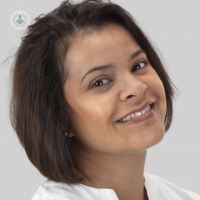Long-term care for dental implants: Tips for maintaining your smile
Written in association with:Dental implants are a popular and effective solution for replacing missing teeth, offering a permanent and natural-looking alternative to dentures and bridges.
While dental implants are designed to be durable and long-lasting, proper care and maintenance are essential to ensure their success over the years.
We invited highly respected dentist and oral surgery specialist Dr Lena Vakil, who specialises in dental implants, to share her advice on the best ways to care for them, and what to avoid to preserve your smile in the long term.

What can negatively affect dental implants?
Several factors can potentially impact the longevity and success of dental implants, including:
Poor oral hygiene
Neglecting to brush and floss regularly can lead to plaque buildup and gum disease, which can compromise the stability of dental implants.
Smoking
Smoking can inhibit the body's ability to heal and increase the risk of implant failure.
Bruxism
Grinding or clenching your teeth can put excessive pressure on dental implants, leading to damage and implant failure over time.
Medical conditions
Certain medical conditions, such as diabetes and autoimmune disorders, can affect the body's ability to heal and increase the risk of implant complications.
Trauma
Accidental trauma or injury to the mouth can damage dental implants and surrounding tissues, leading to implant failure.
What are the best ways to care for a dental implant?
Proper care and maintenance are crucial for preserving the integrity and longevity of dental implants. Here are some essential tips for caring for your dental implants:
Practice good oral hygiene
Brush your teeth at least twice a day with a soft-bristled toothbrush and fluoride toothpaste. Floss daily to remove plaque and debris from between your teeth and around your implants.
Visit your dentist regularly
Schedule regular checkups and cleanings with your dentist to monitor the health of your implants and address any issues early on.
Quit smoking
If you smoke, consider quitting to reduce the risk of implant complications and improve your overall oral health.
Protect against bruxism
If you grind or clench your teeth, wearing a custom-fitted mouthguard at night can protect your implants and surrounding teeth from damage.
Maintain a healthy diet
Eat a balanced diet rich in fruits, vegetables, and lean proteins to support overall oral health and healing.
What should I avoid if I have a dental implant?
To ensure the long-term success of your dental implants, it's important to avoid certain habits that can compromise their integrity:
- Refrain from biting down on hard foods or objects that could potentially damage your implants.
- Limit alcohol consumption as this can contribute to poor oral health and increase the risk of implant complications.
- Inform your dentist about your dental implants before any dental procedures, such as cleanings or fillings, to avoid damaging the implants or surrounding tissues.
- Refrain from attempting to adjust or repair your dental implants on your own. Always consult with your dentist if you have any concerns or issues with your implants.
If you are concerned about the longevity of your dental implant and wish to schedule a consultation with Dr Vakil, visit her Top Doctors profile today.


